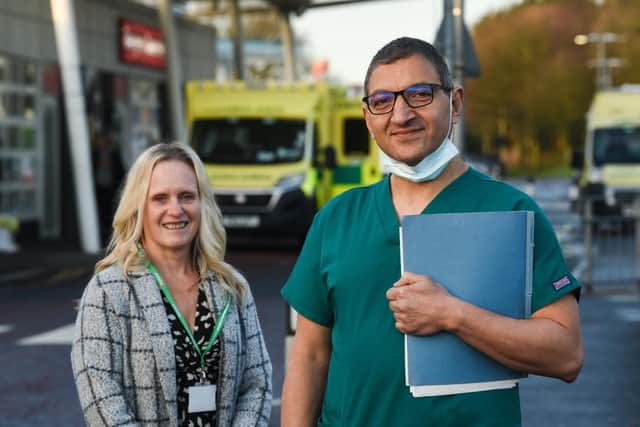Plan to get Preston and Chorley hospital patients more involved in their care
and live on Freeview channel 276
The documents detailing a person’s condition and treatment are usually the sole preserve of the medics looking after them - and are often placed almost symbolically out of reach at the foot of their bed.
However, the doctor-knows-best culture has been rethought at Lancashire Teaching Hospitals NHS Foundation Trust (LTH) - and it is all at the request of one of their own consultants.
Advertisement
Hide AdAdvertisement
Hide AdColorectal surgeon Tarek Hany says that the idea came to him simply after he put himself in the position of the patients he cares for.


“If you look at your case notes, everybody is writing about you - and you are [talked about in] the third person.
“Healthcare all over the world is disease-centred, not patient-centred. We do the best for our patients, that’s for sure, but we often confuse knowledge of the disease with knowledge of the patient and what their needs and wishes are.
“We presume that the option we see is the best one for that individual. Now we are trying to bring patients to the fore by saying to them: you write in your notes about what you understand about your disease and your progress - and any concerns you may have,” Tarek explains.
Advertisement
Hide AdAdvertisement
Hide AdPatients are given a booklet in which they can formulate any questions that they would like to ask their doctor the next time he or she comes to see them - enabling issues to be committed to paper before they are forgotten.
Along with any other thoughts on their treatment, these are then attached to an individual’s case notes, ensuring that they are seen by the staff who can directly address them.
It is a new way of working on the wards which aims to give parity between the perspective of the practitioner and the patient - something which one of those co-ordinating the project appreciates the benefit of more than most.
Andrea Partridge was diagnosed with stage three breast cancer eight years ago - a devastating discovery which led not only to chemotherapy and radiotherapy, but also a mastectomy and reconstructive surgery, for which she was hospitalised.
Advertisement
Hide AdAdvertisement
Hide Ad“I have that experience of being an inpatient and not being able to share what really mattered to me,” recalls Andrea, who is now the service user involvement co-ordinator at LTH.
“This new system really gives patients a voice and it touches on the medical, personal and emotional - so as well as being about their condition, it can be about what will happen when they go home and even issues like childcare. That is so valuable to a patient.
“It turns the doctor-patient relationship on its head. As patients, we usually sit in bed and nod - but this is a case of you being asked to take some control and share what is important to you.”
It is thought that the project is the first of its kind in the country - it has already been introduced on the surgical wards at Central Lancashire’s two hospitals and the intention is to roll it out to every impatient area in the months to come.
Advertisement
Hide AdAdvertisement
Hide AdAndrea believes that it will benefit staff as well as those whom they are treating.
“It’s a two-way thing, it can help make things easier for the doctors and nurses, as well as meeting the needs of the patient.
“I also think it will stop complaints, because what is important to the patient is being addressed at the time it is important to them.”
Tarek says that his hope is for people to feel as though they are part of the team treating them - and so he discounts the suggestion that certain patient contributions to case notes might be more meaningful than others.
Advertisement
Hide AdAdvertisement
Hide Ad“It is about whatever is worthwhile for the patient, not me as the consultant.
“They can put in whatever they want, we just have to answer it. In fact, we don’t even always have to do that.
“I have patients who swear that the beauty of this is just having a chance to express themselves in writing. Once we put our thoughts in writing, things often become a bit clearer for us.
“The ideal [progression of this project] would be if there wasn’t a separate patient contribution to clinical notes, but if everything was together in one note.
“The ultimate transparent patient care is for the patient to write on an equal footing with any healthcare professional,” Tarek reflects.